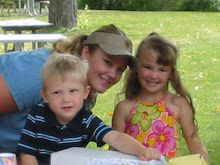I want to share this poem. I didn't write it, but I love it. Today, it spoke to me and I thought I would share.
Growth
Life washes over us in layers.
A liquid refrain.
Mysteries never solved. But evolved.
Questions melt with the snow
And run off, as life washes over us
in layers.
Just something to ponder on this rainy Wednesday.
Wednesday, May 6, 2009
Thought for Today
Posted by Sam at 10:34 AM 1 comments
Tuesday, May 5, 2009
And now for something completely different...
Hello All:
This is probably illegal or sumthin, but I was forwarded this article from a colleague today which had been published on OregonLive.com. This was compelling to me because this is precisely what I do. I am an academic advisor, and it's really hard to put your finger on the essence of what this profession does. The analogy of plowing the soil really spoke to me. The other piece that was interesting to me is explaining a liberal arts education. I am forever explaining general education requiements to students, which is pretty much explaining the value of a liberal arts education. Happy Reading!
What's a liberal education?
by Celia Carlson, guest opinion Friday May 01, 2009, 7:30 AM
 Celia Carlson
Celia CarlsonEditor's note: This is the first in a weekly series of commentary pieces from faculty and staff at Mt. Hood Community college.
Out here in east Multnomah County, we have witnessed dramatic changes as horse pastures and cabbage fields have succumbed to the bulldozer. What protrudes from the soil is now not beanstalks but Jack in the Box, Regal Cinemas, Home Depot, Starbucks, Bed Bath and Beyond, and Borders Books. These are not small businesses, not locally owned enterprises. The jobs our area now grows are those of cashier, not owner.
A college cannot stop change or take away people's fear of displacement. A college is a community that offers basic skills, both theoretical and practical. That is broadly understood. What is less well understood is that it nurtures certain habits of mind.
Academics regularly speak of a "liberal education." Despite the centrality of this concept to the mission of most American colleges, its meaning is not widely understood.
Liberal means open-minded. A liberal education is rooted in the basic beliefs that all minds have potential, that education is essential to freedom, and that a free mind conveys knowledge to others.
This set of beliefs, in the potential and freedom of the human mind, entails a deep commitment to exposure to new ideas. Since language is at the heart of ideas, one goal of a liberal education is cultivating respect for the power of language and for stimulating attention to the different ways in which people understand words. This helps people recognize common purposes amid difference.
A liberal education helps people respond to change because it teaches tolerance for ambiguity. It models good citizenship because it recognizes the claims of others to share in the products of the earth we all have in common.
Ideas are the soil in which colleges cultivate minds, almost like crops. Think of a college as an orchard in which individual minds grow like cherries or peaches. A liberal education "works the soil." It doesn't just plow, pick, collect the money and run. The educational process does not happen overnight; it cultivates the whole person. That takes time. And things that require time cost money.
Words are the soil in which cultures flourish or wither. Words Americans presently dispute include such small explosives as "rights," "taxes," and "mine." Words can be toxic, poisoning our irrigation, or they can be potent fertilizer. They are powerful forces for good or ill because they invoke crucial questions: Does the community have legitimate needs and aspirations beyond the individual? Can we think of "the corporate" inclusively, not just as business, which we value, but as the body of society as a whole, all of whose members deserve consideration?
A student once asked me anxiously after writing an essay about a value she believed in: "I really do think we should care about others. Does that make me a socialist?"
As a society, how do we want to encourage this student to imagine ways in which she can integrate her deep personal commitments with concepts she is encountering and putting to the test? A liberal education challenges us all to ask these difficult questions.
Celia Carlson is an instructor of English at Mt. Hood Community College. The views expressed here do not necessarily represent the position of the college.
Posted by Sam at 10:07 AM 1 comments

